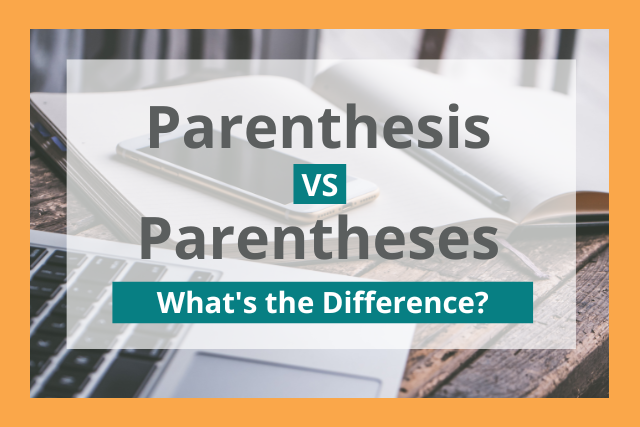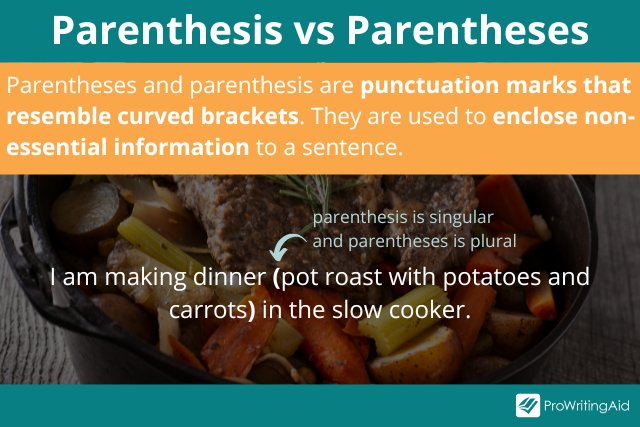
Parenthesis and parentheses are two sides of the same coin. They are common punctuation marks resembling curved brackets ( ) that are used to enclose non-essential or explanatory information in your sentences.
The difference is that parenthesis is the singular form of the punctuation, while parentheses are the plural form. Sometimes, parenthesis also refers to the enclosed non-essential information.
In this article, we’ll look at the difference between parenthesis vs parentheses and how to use them correctly.
Quick Definition and Meaning of Parenthesis
A parenthesis is a punctuation mark that encloses an aside or non-essential information in a sentence. Parenthesis is the single expression of this punctuation mark and resembles a curved vertical line.
The opening parenthesis, which looks like (, is used to begin parenthetical text. The closing parenthesis, ), denotes the end of the parenthetical information.

Parentheses refers to a pair or more of these punctuation marks. Whenever you’re using parentheses in your writing to include additional information, always remember that it’s grammatically incorrect to just use one opening parenthesis or one closing parenthesis. You must always use parentheses in pairs.
Parentheses are also known as round brackets or curved brackets, but these alternative names are only common in British English.
We use parentheses to add information that is classified as non-essential to the sentence that it’s in. It’s simply an aside or an afterthought. In fact, we can remove information enclosed in parentheses from a sentence, and the sentence would still make sense.
- I visited Paris (which was full of tourists) while I was travelling through Europe.
In the example above, the parentheses enclose the parenthetical statement, "which was full of tourists,” which adds a bit of information to the sentence. However, if we removed the statement, the overall meaning would still be the same.
In some cases, you may see a parenthesis described as the word, phrase, or expression that is enclosed in parentheses. Those enclosed expressions are also referred to as a “parenthetical element.” It’s better to reserve the word parenthesis for the punctuation mark for clarity.
What’s the Singular Form: Parenthesis or Parentheses?
The singular form is parenthesis, which is only one of the curved brackets, while the plural parentheses denotes the pair of open and closed curved brackets. Both words are of Greek origin. In terms of using the punctuation marks, you will almost always want to use them as a pair (parentheses).
The work of parentheses is similar to that of other pairs of punctuation marks, like the comma and em-dash. They all interrupt the flow of sentences. In fact, in certain instances, information set off by parentheses can also be set off by commas or em-dashes.
- My friend Emily (who is two years older than me) is coming to my apartment later.
- My friend Emily—who is two years older than me—is coming to my apartment later.
- My friend Emily, who is two years older than me, is coming to my apartment later.
Emily’s age difference isn’t essential to the meaning of the sentence, so we set it aside using punctuation.
Sometimes, the parenthetical element is an entire sentence. You can put the whole thought in parentheses, as in the example below:
- My friend Emily is coming to my house later. (She’s two years older than me.)
If you put an entire sentence in parentheses, put the ending punctuation before the closing parenthesis. However, if the parentheses are part of another sentence, close them before the end marks.
Examples of Parenthesis vs Parentheses Used in Sentences
In sum, the information found in parentheses can be a word, a sentence fragment, or an entire sentence. Let’s look at a few examples.
- Your use of critical analysis in the last essay (which was fluently written) demonstrated how to form a convincing argument.
- We're so glad you could be here tonight (particularly the long-time fans), and now I ask you to put your phones on silent as we begin the show.
- Please look closely at the picture. (You’ll be surprised.)
- Jonathan perfected his slide tackle (after months of practice at home) and could now join the school's football team.
- Most of the visitors (the only exception was Oliver) were vegetarian.
We can also find the use of parentheses in literary works when authors want to add secondary information or an aside in their thoughts:
what if a much of a which of a wind
gives the truth to summer’s lie;
bloodies with dizzying leaves the sun
and yanks immortal stars awry?
Blow king to beggar and queen to seem
(blow friend to fiend: blow space to time)
when skies are hanged and oceans drowned,
the single secret will still be man
—E.E. Cummings, “what if a much of a wind”
Here’s another example:
And will you succeed? Yes! You will, indeed! (98 and 3/4 percent guaranteed). Kid, you’ll move mountains.
—Dr. Seuss, Oh, the Places You’ll Go
While parentheses are used to enclose supplemental information, they also have special functions such as enclosing numbers or letters that introduce items in a list or outline.
- I will be visiting three different cities in the United Kingdom: (1) London, (2) Bristol, and (3) Manchester.
- Throughout the experiment, participants were told to avoid (a) fizzy drinks (b) fried food (c) caffeine.
Parentheses can be used in formal writing, such as academic papers. They are used to enclose abbreviations, citations, or just to include referencing quotes.
- The The British Broadcasting Corporation (BBC) utilises TV and radio.
What Does “Parens” Mean?
Sometimes, you might see the word “parens” used in texts. Parens is actually the shortened version of parentheses.
It’s most frequently seen in informal contexts. Like parentheses, it also refers to the pair of punctuation marks that resemble vertical curves.
Conclusion: Parenthesis vs Parentheses = Singular vs Plural
Now you understand the difference between parenthesis vs parentheses. Use parenthesis for a single punctuation mark and parentheses for two or more. Check your punctuation usage with ProWritingAid’s free grammar checker, so you never misuse a punctuation mark.

